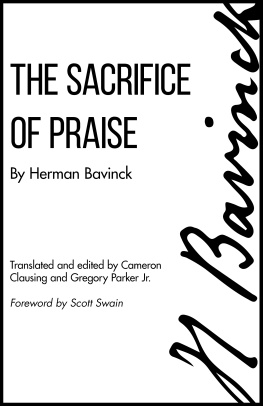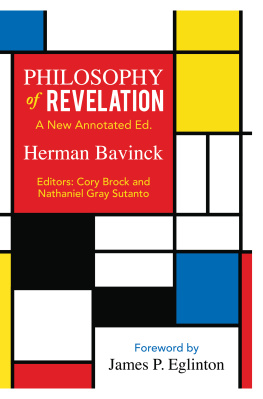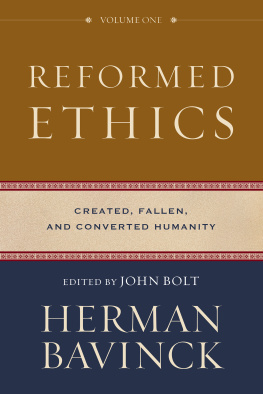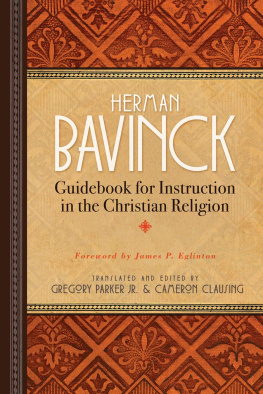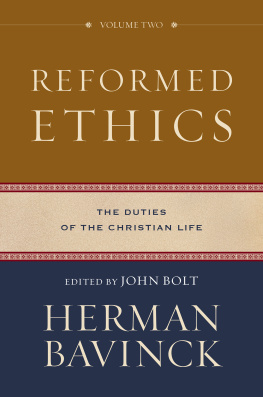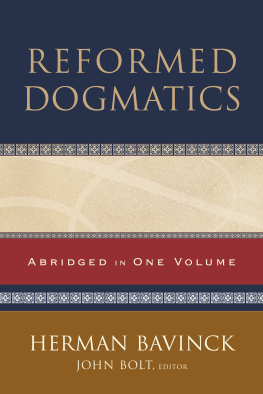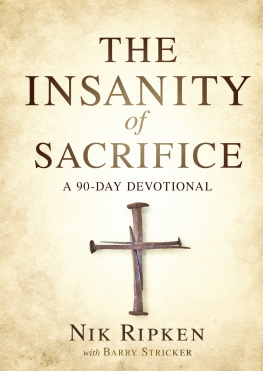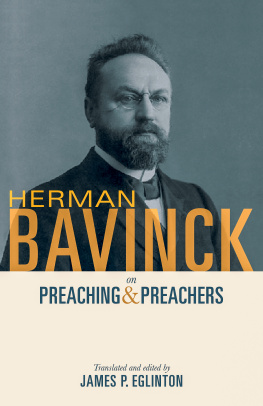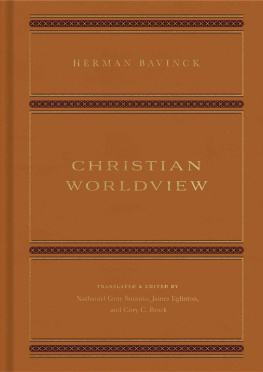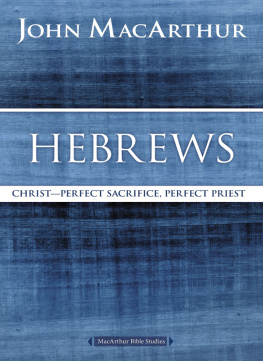Foreword
The past several decades have witnessed a renewal of Reformed theology in North America and the United Kingdom. This renewal has been fueled in no small measure by the translation and publication of significant works of Reformed theology in the English language. Among the recently translated works that have enabled a new generation of Christians to retrieve the riches of the Reformed heritage, Herman Bavincks four-volume Reformed Dogmatics holds a distinguished place. Originally published in Dutch at the beginning of the twentieth century, Bavincks Reformed Dogmatics offers todays church a mature statement of Reformed teaching that is comprehensive in scope, conversant with a wide range of ecclesiastical and modern viewpoints, irenic in tone, and doxological in aim.
Unfortunately, the renewal of Reformed theology in recent days has not, in every instance, resulted in a corresponding renewal of Reformed practice and piety. This is a lamentable situation. Though we may be grateful for conferences and websites that celebrate the sovereignty of God and the doctrines of grace, if the renewal of Reformed theology is to beget anything more than a movement, it must find concrete expression in the churchs life and ministry. Reformed theology will not flourish in the long run if it does not take root in the church of Jesus Christ. Thankfully, the same strategy for renewing Reformed theology through the publication of classic texts can aid the renewal of Reformed practice and piety. Here too Herman Bavinck has gifts to give.
Herman Bavincks TheSacrificeof Praise is best understood as a work of catechetical theology, suitable for sharing with baptized Christians on the occasion of their public profession of faith and admission to the Lords Table. The books focus, as the title suggests, is the Christian duty of confessing Jesus Christ as Lord before God and human beings. This duty, Bavinck argues, is a delightful task, a sacrifice of praise (Heb. 13:15) to the Triune God.
The Sacrifice of Praise exhibits many of the virtues that readers have come to appreciate in Bavinck the theologian. Always with an eye focused on the supreme Lordship of the Triune God, and therefore on all that falls within his sovereign domain, Bavinck treats a range of topics whose height and depth span heaven and earth and whose breadth and length span from the beginning and to the end of the world. In each instance, he is mindful of his topics relation to the Triune God and to the full scope of Gods works in creation, redemption, and consummation. Bavinck traces the unfolding administration of Gods kingdom in the covenant of redemption, the covenant of works, and the covenant of grace. He expounds Gods work of grace and our work of gratitude, ably distinguishing (without dividing) and relating (without confusing) divine and human agency within the covenant of grace. Bavinck describes the act of confessing Jesus as Lord in its various formal and informal, individual and communal contexts, all the while acknowledging the fundamental unity of the Christian confession. In discussing these and other topics, The Sacrifice of Praise presents a compelling vision of Christian discipleship as devotion to Jesus as Lord in word and deed, worship and witness.
Even when writing for a popular audience, Bavinck always penetrates to the heart of the topic he addresses. The present topic is no exception. According to Bavinck, confession holds the place it does in the Christian life because of who God is and because of who we are as creatures, made and renewed in his image. From all eternity, God is an eloquent God. The Father eternally utters his Word in the person of his Son. Through his self-same Word and Son, the Father creates, rules, redeems, and perfects all things for the sake of his name. Furthermore, as those created and renewed in Gods image, we are eloquent creatures. Speech is the crowning glory of our identity and calling. The image of God shines most clearly in us when we confess with our lips that Jesus is Lord. Our calling as Gods vice-regents in the world shines most clearly in us when we summon the rest of Gods creatures in heaven and on earth to join us in praising the name of the Lord: My mouth will speak the praise of the Lord, and let all flesh bless his holy name forever and ever (Ps. 145:21).
Along with the aforementioned virtues of Bavinck the theologian, this book exhibits the virtues of Bavinck the churchman. Bavinck traces the progress of Christian nurture from baptism through confession to participation in the Lords Supper, demonstrating the organic relationship that binds the various elements of Christian nurture together. He discusses the relationship between the individuals personal profession of faith and the churchs historic confessions, steering a course between an insecure pietism and a cold orthodoxy. He treats the place of parents, schools, and churches in Christian nurture, rightly emphasizing the priority of the word of God among the various means of grace that God has appointed for his people. Alert to the challenges that threaten the Christians confidence in this vale of tears, Bavinck grounds the security of the Christians confession in Jesus Christs faithful confession and inspires the Christian to look with eager expectation to the day when every knee will bow and every tongue will confess that Jesus Christ is Lord to the glory of God the Father.
As the father of four children, I was especially encouraged by the wisdom this book conveys. Our children find themselves at various stages of Christian discipleship and therefore with various needs for instruction and encouragement in the Lord. My youngest child is ready to make his public profession of faith before the church. My oldest child is about to head off to university. In Bavincks The Sacrifice of Praise, I found a treasure trove of resources for instructing and encouraging our children in their various stages of Christian discipleship. I trust that other pastors, teachers, and parents will find this book to be a valuable resource as well.
The Sacrifice of Praise may be profitably read alongside two other books of catechetical theology written by Herman Bavinck. The Wonderful Works of God is a compendium of Christian doctrine that clearly and concisely summarizes the main elements of biblical teaching confessed by Reformed churches. Savedby Grace: The Holy Spirits Work in Calling and

